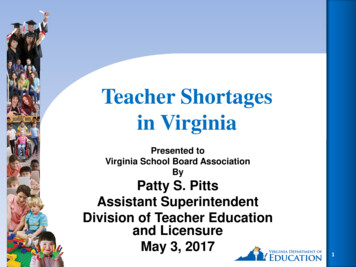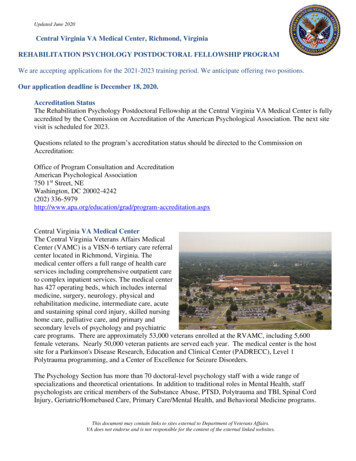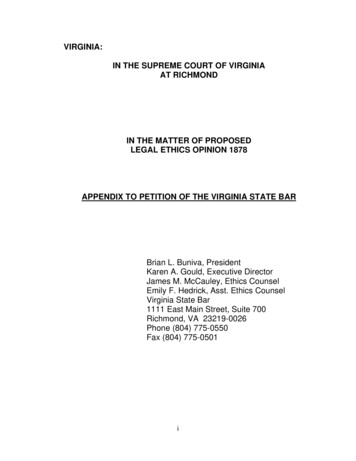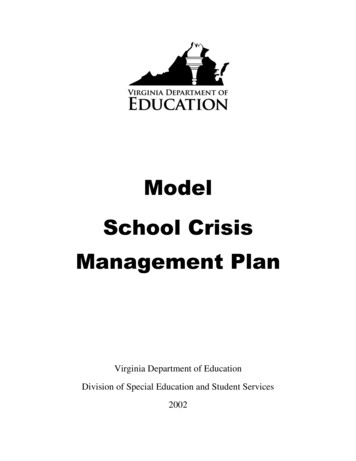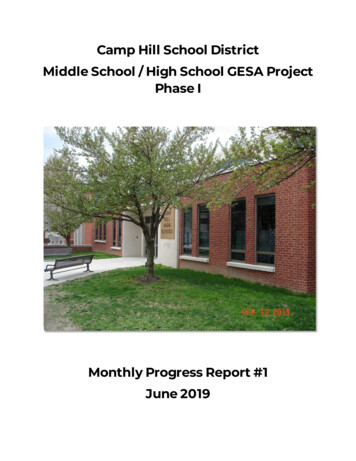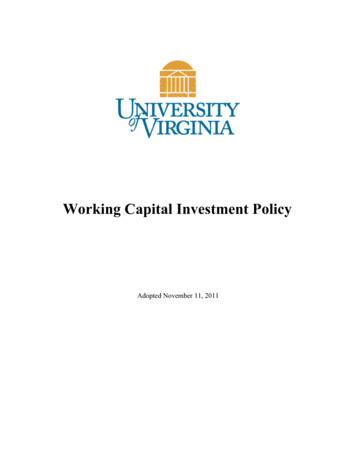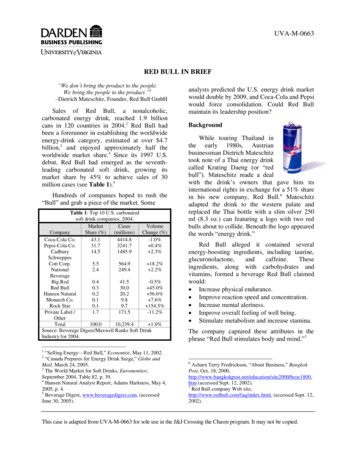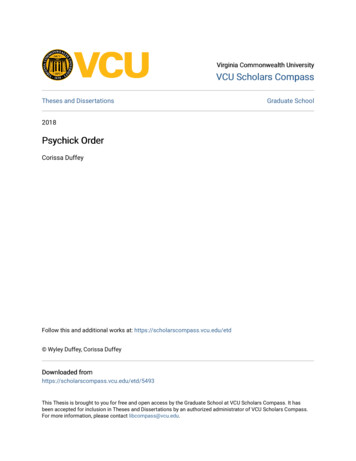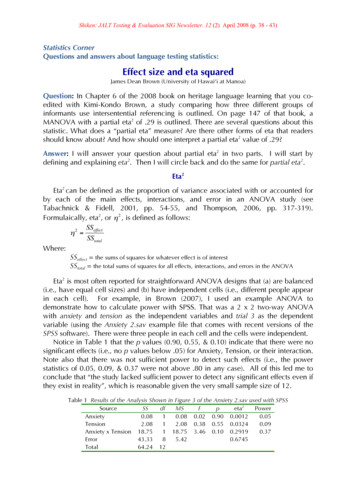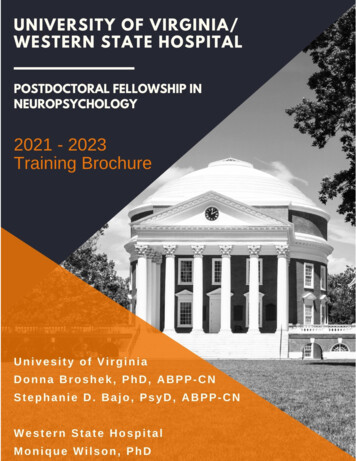
Transcription
University of Virginia School of Medicine / Western State HospitalPostdoctoral Fellowship in Clinical NeuropsychologyUVA School of Medicine – Neuropsychology Assessment ClinicDepartment of Psychiatry & Neurobehavioral SciencesDonna K. Broshek, PhD, ABPP-CN, Program & Training DirectorStephanie D. Bajo, PsyD, ABPP-CN, Assistant Training DirectorWestern State Hospital – Neuropsychology ServiceMonique Wilson, PhD, Program & Training DirectorApplication Deadline:APPCN Member Program:January 4, 2021YesOpenings:Start Date:1July to September 2021IntroductionThe Department of Psychiatry and Neurobehavioral Sciences at the University of Virginia (UVA) offers a two-yearfull-time postdoctoral fellowship in clinical neuropsychology. We are currently recruiting for two postdoctoral fellowsfor the 2021-2023 training period. Our training program has been designed in accordance with the HoustonConference guidelines for postdoctoral training in clinical neuropsychology. We have been an APPCN MemberProgram since 1993 and we participate in the APPCN match. As an APPCN program, our training fulfills eligibilityrequirements for board certification in clinical neuropsychology through the American Board of ProfessionalPsychology. The application deadline is Monday, January 4, 2020. Interviews will be conducted via videoconferenceduring late January through mid-February, 2021.Commitment to Inclusion and DiversityThe Graduate Medical Education department works closely with UVA faculty and the Housestaff Council for Diversityand Inclusion (HCDI) to stimulate meaningful conversations about race, privilege, and representation in ourcommunity. The HCDI is committed to promoting diversity and tolerance within the housestaff community by buildinga culture of inclusion and respect, engaging with future housestaff members, and leveraging the diversity of itsmembers in collaboration with the greater Charlottesville community. Our goal is to ensure that all residents, nomatter their race, sexuality, country of origin, gender, religion or able-bodiedness, feel included at UVA.UVA Health has established a Diversity Consortium and built new connections to the SOM Office for Diversity andInclusion. Every department now has a diversity liaison and diversity plans. These efforts have made an impact.Within GME, we have seen increases in our underrepresented residents (from 7% in 2014-15 to 12% in 2018-19)and fellows (from 6% to 15% for the same time periods.) In 2014-15, our faculty included 45 underrepresentedminorities, and today we have 64. These increases have come about because we value diversity and have takenspecific steps to increase the number of underrepresented minorities in our candidate pools.1
Overview of Fellowship Program Training StructureThe primary training site for the Neuropsychology Postdoctoral Fellowship program is at the NeuropsychologyAssessment Clinic, which is located within the main UVA academic medical center campus in Charlottesville, Virginia.Fellows also complete a major rotation at Western State Hospital (WSH). For fellows particularly interested inforensics, additional training opportunities are available with Dr. Bender through the UVA Institute of Law, Psychiatry,& Public Policy (ILPPP) Forensic Clinic.The principal components of the fellowship include adult neuropsychology outpatient assessment, inpatientconsultation, and diagnostic services (80%); teaching and professional development (10%); and research (10%).Clinical SettingsUVA School of Medicine – UVA HealthUVA has been rated the #1 hospital in Virginia for the 5th consecutive yearby US News & World Report. The medical education and patient careprogram was established in 1825 and was the 10th medical school to openin the United States. The mission of UVA Health is to provide excellence,innovation and superlative quality in the care of patients, the training ofhealth professionals, and the creation and sharing of health knowledgewithin a culture that promotes equity, diversity, and inclusiveness. TheGraduate Medical Educational training program oversees the training ofmore than 800 residents or fellows across 82 specialties, sub-specialties,and training programs, including postdoctoral training in clinical psychologyspecialties such as neuropsychology.Western State HospitalEstablished in 1825 as the 2nd mental health facility in Virginia, WSH is astate psychiatric hospital with a mission of providing safe and effectiveindividualized treatment in a recovery focused environment. UVAexpanded its affiliation with WSH in 1978 and established training rotationsand other academic affiliations. In 1990, the hospital received the firstNational Award from the American Psychiatric Association as theexemplary program in collaborative services between a public mentalhealth facility and a university. Housed in a new state of the art facility,WSH is located in the Shenandoah Valley and is a 40 minute scenic drivefrom Charlottesville.Clinical Training ExperiencesUVA School of Medicine – UVA HealthNeuropsychology Assessment ClinicWe primarily conduct outpatient neuropsychological assessment of adults with neurological, neuropsychiatric,and complex medical disorders. We have three full-time psychometrists who administer neuropsychologicaltesting. We staff several specialty clinics/services (listed below) and work closely with colleagues from multipledisciplines.2
Our primary populations include: concussion/TBI (including sport concussion), epilepsy, functional neurologicdisorders (including psychogenic non-epileptic spells), student-athletes, and solid organ transplant (lung, liver,and kidney) candidates. We additionally see a wide range of other conditions, including autoimmune andinfectious disorders (e.g., HIV/AIDS and encephalitis), early-onset/atypical dementias, medication- orsubstance-induced cognitive impairment, hypoxic/anoxic brain injury, cerebrovascular disease, sleep disorders,psychiatric comorbidity, postoperative cognitive dysfunction, and neurodevelopmental disorders. With theexception of individuals with TBI, epilepsy, or organ transplant, we do not typically see patients over the age of65.Fellows will gain experience with issues related to secondary gain and performance validity testing, most oftenin the context of concussion/TBI. There are opportunities to complete independent medical, fitness for duty, andother forensic evaluations with Drs. Bender and Bajo. In addition to outpatient experiences, fellows are on-call1-2 days per week (only during normal business hours) for inpatient consults, the vast majority of which are forPNES or expedited lung transplant evaluation.FE. Dreifuss Comprehensive Epilepsy ProgramWe conduct pre- and post-surgical evaluations for epilepsy patients as part of UVA’s Level 4 comprehensiveepilepsy program. Fellows gain experience presenting neuropsychology findings to a multidisciplinary teamconsisting of neurology/epileptology, neurosurgery, neuroradiology, psychiatry, and nursing during the weeklyepilepsy surgical conference. There are numerous opportunities to observe Wada procedure, cortical mapping,and neurosurgery. See more information here.Acute Concussion Evaluation (ACE) ClinicFellows complete a rotation in the weekly multidisciplinary ACE Clinic, which is staffed by us, a neurologist, aneurology nurse practitioner, and an occupational therapist. ACE is a half-day consultative clinic for individualswho experienced a concussion or mild TBI within the last 6 months. We conduct clinical interviews and provideeducation to patients on concussion recovery and symptom management. Neuropsychological testing is notadministered in ACE, but patients are sometimes referred to our main clinic for comprehensive assessment.Lung Transplant TeamWe see every patient who is being considered for lung transplant to evaluate their cognitive abilities, emotionalfunctioning, understanding of transplant, motivation and willingness, and aftercare plan. Based on our results,we identify and provide recommendations for potential neuropsychological concerns that could impact transplantoutcome. We participate in the weekly lung transplant selection committee meeting. The lung transplant servicehas a highly coordinated multidisciplinary team that includes pulmonologists, surgeons, social work, nurses andnurse coordinators, dieticians, pharmacists, and physical therapists. We also see potential transplant candidateson an inpatient basis when they are admitted to the hospital for expedited work-up due to rapidly decliningpulmonary status. See more information here.Epilepsy Monitoring Unit (EMU) Consult ServiceWe are consulted when individuals admitted to the EMU are diagnosed with non-epileptic spells. We conductpsychodiagnostic interviews to assess for risk factors for psychogenic non-epileptic spells (PNES), and weprovide patient and family education and treatment recommendations.UVA Athletics DepartmentWe conduct screening assessments and comprehensive psychoeducational evaluations for UVA Division Istudent-athletes. Common referral questions include ADHD and learning disorders. We also occasionally seeathletes for concussion-related evaluation and comprehensive evaluation to inform decisions about medicalretirement secondary to multiple sports related concussions.3
Western State Hospital Neuropsychology ServicePrimary Neuropsychology ServiceAs a state psychiatric hospital, WSH provides care primarily to individuals with serious mental illness (e.g.,schizophrenia spectrum, bipolar disorder, severe depression, substance-induced psychosis). Many patientshave some degree of developmental delay or intellectual disability. A sizeable minority of patients have psychoticsymptoms secondary to neurological and neurodegenerative conditions, such as delirium and dementia withLewy bodies. Patients often have legal charges and many are at WSH for restoration of competency to standtrial. Common referral questions include assessing for cognitive barriers to restoration of trial competence,differential diagnosis of primary versus secondary psychiatric disorders, and evaluation for substance-relatedcognitive impairment (e.g., Wernicke-Korsakoff). Fellows gain experience with forensic issues and assessmentof performance and symptom validity. There is a full-time psychometrist who completes all testing. Fellows areobserved conducting interviews and can observe their patients testing through a two-way mirror.Cognitive Screening ClinicFellows conduct brief interviews and cognitive testing with WSH patients during the weekly Screening Clinic toidentify those who may benefit from full evaluation. This clinic gives fellows an opportunity to see patients witha wide range of presenting issues and acuity levels, and to provide brief feedback to the patient and treatmentteam.SupervisionFellows typically work with each attending faculty weekly. Training is individualized and developmental, and isdesigned to prepare fellows for independent practice. Fellows are treated as junior colleagues and are an integralpart of our clinic. Depending on their level of experience with various patient populations, fellows initially observe orco-interview with faculty. As fellows gain experience in our clinic, they are expected to independently conduct clinicalinterviews and feedbacks, coordinate with other providers, and take a primary role in all aspects of a patient’s care.During the first year, weekly structured supervision is provided, in addition to case-by-case as-needed discussion.As fellows progress through their first year and into their second year, supervision becomes less structured and moreakin to consultation. Second-year fellows take on more administrative tasks necessary for running a neuropsychologyclinic, and provide training to first-year fellows. Fellows also provide formal tiered supervision to psychology practicumstudents and medical/psychiatry residents completing a rotation in our clinic.Didactics and EducationClinic Journal Club/Professional Issues: Our clinic holds a weekly meeting to discuss relevant articles, currenttopics in the field, quality improvement projects, and interesting clinical cases.Neuropsychology Seminar Series: Neuropsychology fellows from the Departments of Psychiatry and Neurologymeet once a week for a seminar series designed to prepare fellows for board certification in neuropsychology.Speakers are brought in from other departments and institutions to cover a wide range of neuropsychology,neurology, and professional development topics. Fellows are required to present once per training year on topicsreadily utilized in the clinical practice of neuropsychology which can assist attendees in board preparation (e.g.,neuroanatomy; clinical syndromes; interesting case presentations). Additionally, each fellow completes a full mockABPP exam, including written exam, fact finding, and work sample defense, administered by faculty members whoalso serve as ABPP examiners.Neurology Grand Rounds: We typically attend the weekly Department of Neurology Grand Rounds. Recentexamples of presentation topics include Interactions of Sleep and Epilepsy; Functional Neurologic Disorders;Parkinson’s disease and DBS: Neuropsychological assessment and non-motor outcomes; Unlocking the4
pathophysiology of SUDEP; Islam and health issues; Walk this way: Music and Parkinson’s disease; Neurologicalcomplications of cancer immunotherapy; and Radiation neurotoxicity in lower grade gliomas: The good the bad andthe ugly.Medical Psychology Fellows’ Seminar: Fellows attend a monthly professional development seminar series withthe behavioral medicine and forensic psychology fellows in the Department of Psychiatry and NeurobehavioralSciences. Dr. Amit Shahane, Director of the UVA Medical Psychology Fellowship Program, coordinates this monthlyseminar.Medical Neuroscience Course: Second-year fellows have the opportunity to audit selected portions of the MedicalNeuroscience course in the UVA medical school curriculum.Optional Didactic Opportunities: UVA Psychiatry Grand Rounds, WSH Grand Rounds, UVA NeuropathologyRounds (brain cuttings), UVA Neuroradiology Rounds, UCSD web didactic series, and ILPPP forensic case series.There are numerous opportunities to present during grand rounds/departmental meetings, or to guest lecture ingraduate classes.ResearchParticipation in research is not a major focus of our clinical fellowship, but fellows are expected to participate inacademic activity. Opportunities include participating in independent or ongoing clinical research, co-reviewingarticles with a faculty member for a variety of academic journals, writing case studies, and more. Collaborativeresearch with our colleagues in Kinesiology and access to the sports concussion database is an excellent opportunityfor projects related to sports concussion. Collaborations with our academic colleagues in the epilepsy program andother medical specialties are also available. At WSH, the longstanding neuropsychology database provides richopportunities for research. While there is no protected research time, fellows typically maximize researchopportunities during gaps in the clinical schedule (e.g., no-shows, cancellations).FacultyDonna K. Broshek, PhD, ABPP-CN, University of VirginiaDr. Broshek is the John Edward Fowler Professor of Psychology at the UVA School ofMedicine with a primary appointment in Psychiatry and Neurobehavioral Sciences,where she is Director of the Neuropsychology Assessment Clinic and Chief ofPsychological Services. She is also Co-Director of the Acute Concussion EvaluationClinic. Clinically, Dr. Broshek sees a large volume of patients with sports concussion,mild to moderate traumatic brain injury and persisting symptoms after concussion, aswell as patients with intractable epilepsy and a variety of other neurologic and medicalconditions. She is a member of the Concussion Committee for the NBA and WNBAand a consultant to the US Olympic and Paralympic Committee for concussionmanagement. She is a Fellow of the National Academy of Neuropsychology and theSports Neuropsychology Society, Immediate Past President of the SportsNeuropsychology Society, Executive Committee Member of the Athlete Brain HealthFoundation, and a member of the Professional Advisory Board for the EpilepsyFoundation. Dr. Broshek serves as the inaugural Executive Director of the SportsNeuropsychology Society. She has been active in research on sports concussion andmTBI, as well as national clinical trials for the treatment of intractable epilepsy. Dr.Broshek has been active at the local, regional, and national levels in promotingconcussion education and safety. In 2014, Dr. Broshek was recognized with the MasterEducator Award through the UVA Graduate Medical Education Program after5
nomination by her fellows; she is the only psychologist and non-MD faculty in theSchool of Medicine to have been awarded this distinction. In 2019, she was awardedthe Distinguished Service Award by the National Academy of Neuropsychology.Stephanie D. Bajo, PsyD, ABPP-CN, University of VirginiaDr. Bajo is an Assistant Professor at the UVA School of Medicine, with a primaryappointment in the Department of Psychiatry and Neurobehavioral Sciences, where shealso serves as Assistant Training Director of the neuropsychology fellowship program. Dr.Bajo completed her neuropsychology fellowship at University of Virginia/Western StateHospital and subsequently joined the faculty at UVA in 2016. Clinically, she sees patientswith a range of medical, neurological, and psychological co-morbidities, although primaryclinical interests include concussion/TBI, epilepsy, infectious disease, and functionalneurological disorders (FND). As an equestrian, she also has a specific clinical andresearch focus in sports concussion related to horse-back riding. Dr. Bajo conductsforensic neuropsychological assessments, including Worker’s Compensation evaluations,Independent Medical Examinations (IME), and Fitness for Duty (FFD) evaluations. Shealso heads the Spells Workup Assessment Team (SWAT), which is an inpatient consultservice dedicated to providing targeted clinical interviews to patients diagnosed with NonEpileptic Spells (NES) while admitted to the Epilepsy Monitoring Unit. Outside of her roleat UVA, Dr. Bajo serves as a co-chair on the Legislative Action and Advocacy Committee(LAAC) through the National Academy of Neuropsychology (NAN).Scott D. Bender, PhD, ABPP-CN, University of VirginiaDr. Bender is an Associate Professor of Psychiatry & Neurobehavioral Science at the UVASchool of Medicine. He obtained his PhD at the University of North Texas where he beganhis studies of malingering detection under the mentorship of Richard Rogers, PhD. Aftercompleting his internship in clinical neuropsychology at Yale University, Dr. Bendercompleted his postdoctoral fellowship in the department of Neurology at the University ofVirginia. He joined the UVA department of Psychiatry and the Neurocognitive AssessmentLab in 2002 and has been with the Department’s Institute of Law, Psychiatry & Public Policysince 2005. His primary duties include conducting clinical and forensic neuropsychologicalevaluations, teaching, and publishing manuscripts. His areas of research involvedifferential diagnosis of malingering and the effects of traumatic brain injury (particularlymild TBI) on neurocognitive and emotional functioning. He is often invited to speak atnational conferences and is frequently called to testify in both civil and criminal legal cases.Dr. Bender has authored multiple published manuscripts, articles, and chapters and is coeditor of the 4th edition of Clinical Assessment of Malingering and Deception.Monique Wilson, PhD, Western State Hospital, UVA Adjunct FacultyDr. Wilson is Director of Behavioral Medicine at WSH and adjunct Assistant Professor ofPsychiatry and Neurobehavioral Sciences at UVA. She obtained her MA in ClinicalPsychology at New York University
clinic, and provide training to first-year fellows. Fellows also provide formal tiered supervision to psychology practicum students and medical/psychiatry residents completing a rotation in our clinic. Didactics and Education Clinic Journal Club/Professional Issues: Our clinic hol
